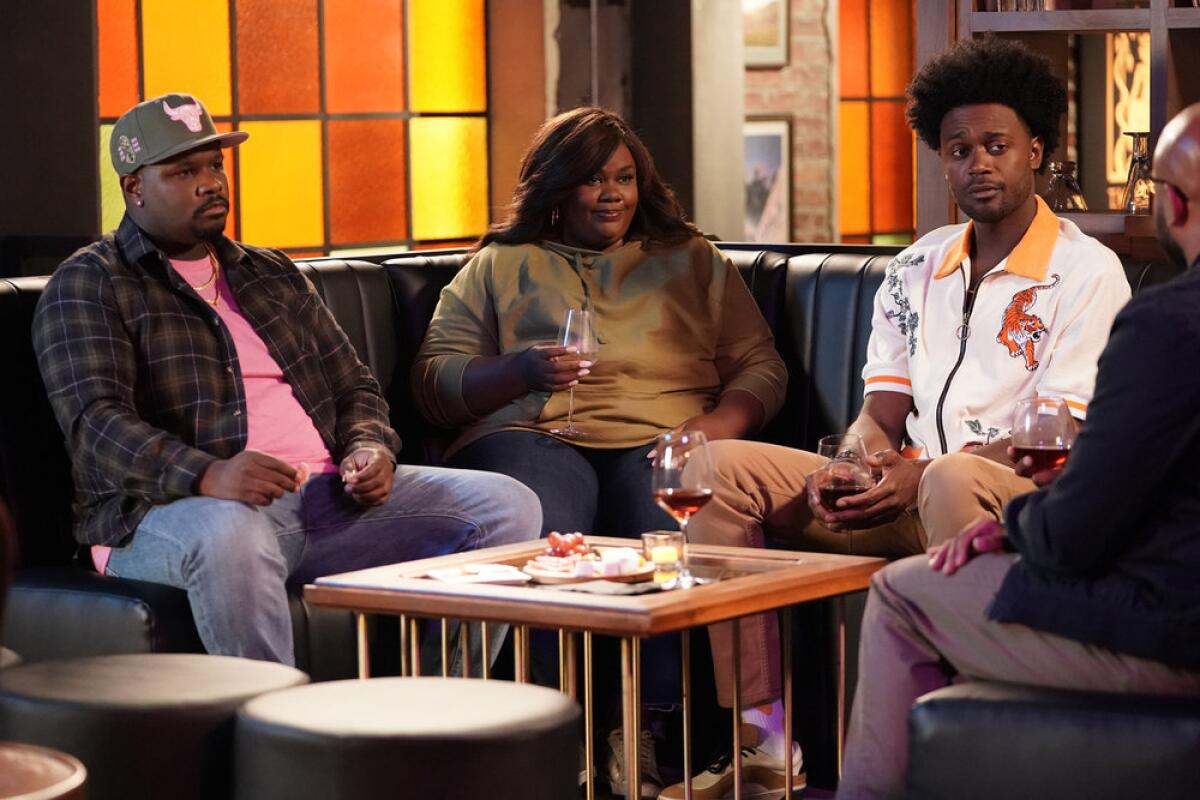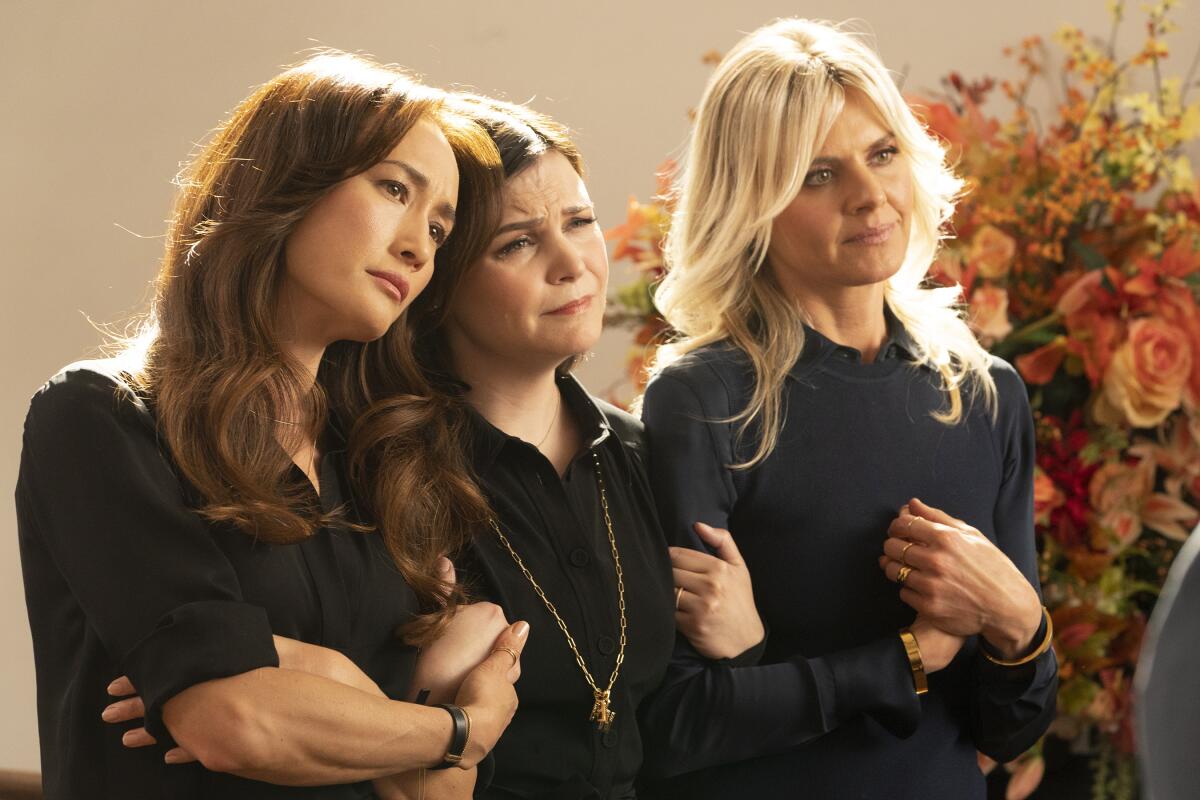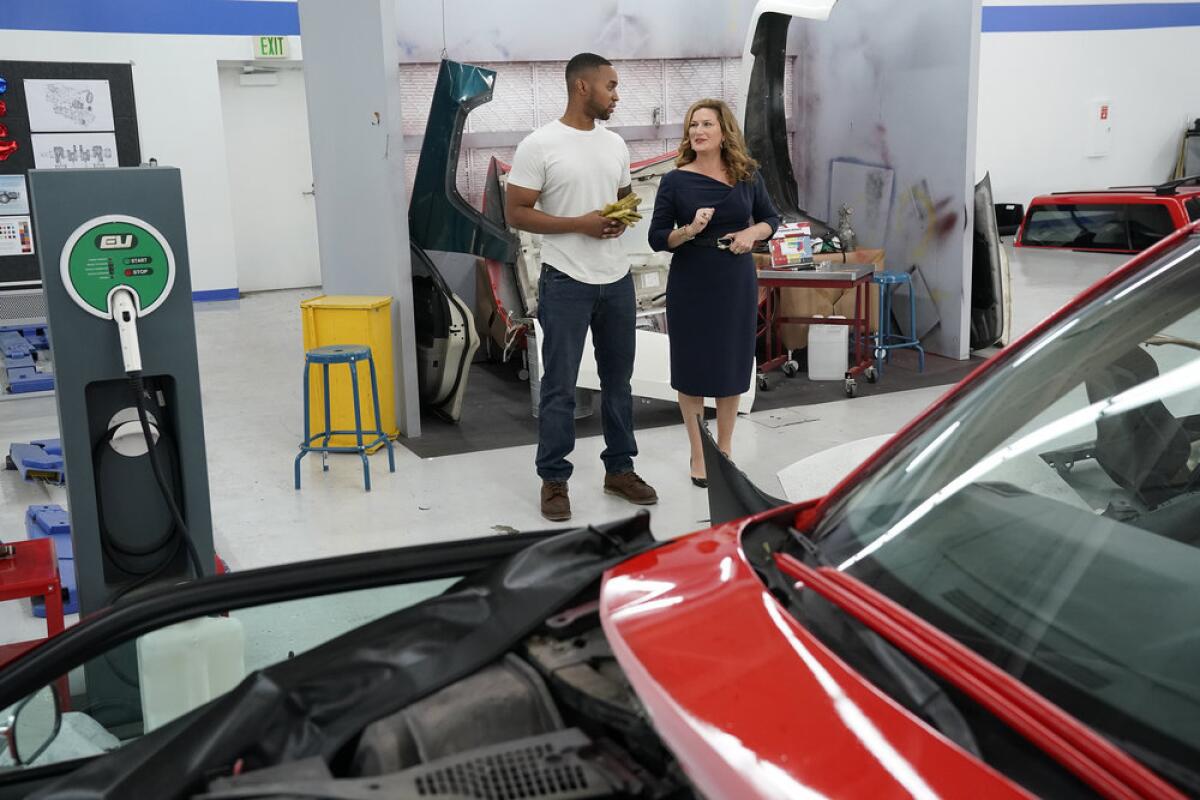Our critic picks 3 new sitcoms worth your time — and one that needs time to grow

- Share via
The new year is here, and with it the dogged, half-noticed return of what used to be called midseason, back when television was set to the industrial ecology of the broadcast majors. The first days of 2022 bring the official premieres of four network sitcoms — three were “previewed” in December — two of them friendship comedies, two workplace comedies.
In a world of flashy cable and streaming shows operating outside of FCC standards, network series no longer reap the big awards, and attract far less media interest, but people do watch them, often in greater numbers than watch Those Shows Supposedly Everyone Is Talking About. Is “What We Do in the Shadows?,” the dark FX vampire comedy, better than “Ghosts,” the light CBS haunted house comedy? It depends on what you’re looking for (and you’re allowed to like both).
The perceived unimportance of broadcast television creates opportunity of a sort; in reversal of historical trends, the older platform provides the alternative — family entertainments, more or less, stretched over long seasons. Network shows, which still routinely log more than 20 episodes a season, appearing week by week, may not spark conversation. But they create relationships, not merely between the characters but between the characters and the audience; after decades, they can still trigger familial feelings.
Of the four new sitcoms, the most buoyant, and easiest to recommend to a broad demographic, is ABC’s delightful “Abbott Elementary” — like the network’s fine “Wonder Years” reboot, you can watch it with your kids or your grandparents without embarrassment. Created by Quinta Brunson, one of the pillars of the first season of “A Black Lady Sketch Show,” it stars Brunson as Janine Teagues, a teacher embarking on her second year at a Philadelphia elementary school, eager and optimistic despite practical hardships and how much she still has to learn about managing a classroom. “Look,” she says in the pilot, “I know this school is rough, but I became a teacher to make sure students get out alive.”
The TV obsessives here at The Times select the new and returning shows they’re most looking forward to this year.
Presented mockumentary style, the series feels fresh even as it mines the familiar. As much as the characters represent an agglomeration of types, they are well written and the actors invest them with life. Surrounding Brunson are Sheryl Lee Ralph as a no-nonsense, 20-year veteran on whom Janine has a professional crush; Lisa Ann Walter, another old hand, as a South Philadelphia Italian with “connections”; Chris Perfetti as a fellow newish recruit, painfully conscious, when not conscious enough, of being a white teacher in a Black school; Tyler James Williams, who arrives in the pilot as a substitute and seems positioned as a romantic possibility for Janine (they meet cute over a malfunctioning toilet); and the quite hilarious Janelle James as the self-interested principal: “If you don’t respect me,” she tells her staff, “you don’t respect this school… It’s mathematically impossible.”
Like her screen alter ego, Brunson is not afraid to display a little purpose, giving Ralph’s character an inspirational speech on the roles a teacher serves: “We are admin, we are social workers, we are therapists, we are second parents — hell, sometimes we are even first,” to which Walter’s adds, “It’s a calling — you answered.” Indeed.

Created by Phil Augusta Jackson, whose writing credits include “Insecure,” NBC’s amiable “Grand Crew” likewise looks at Black professionals, but moves north from South L.A. to what is now called the East Side — the groovy climes of Silver Lake and Echo Park and such — and switches the focus from female friendships to (mostly) male, with an emphasis on sensitivity. (Nicole Byer provides ballast as the resident woman.) That this might represent new territory for some portion of the broadcast audience — if only in view of the network — is made clear in the pilot, which tacks on a prologue in which Garrett Morris explicitly introduces the idea that Black men have ordinary feelings; they “love,” “laugh,” “care” and “cry” (including at “Paddington 2,” a major storyline driver in one episode). “We have a softer, more sensitive side,” says Morris. “We got layers, y’all.”
Making up the 30-something ensemble are Noah (Echo Kellum), whose view of love has been deformed by too many rom-coms, giving him “a giant Nicholas Sparks novel with two white people on the cover where your heart should be,” in the words of sister Nicky, played by Byer, who has no such problem; odd couple roommates Anthony (Aaron Jennings, the Felix) and Sherm (Carl Tart, the Oscar); and happily married man Wyatt (Justin Cunningham), whose wife is little seen. Friction among them always gives way to affection. The comedy is exaggerated but efficient, and like most of these series, and network comedies in general, it is not cynical or ironic.
The title is a pun on the wine classification grand cru — the characters hang out in a wine bar— and perhaps on the literal meaning of the phrase, “great growth.” “Wine is Black now,” says Sherm, having demonstrated unexpected knowledge. (As if in support of that statement, OWN has the series “The Kings of Napa” coming later this month, a sort of Black “Falcon Crest.”)

In the appealing “Pivoting,” premiering Sunday on Fox, three suburban women look at their lives after the death of a fourth friend. Amy (Eliza Coupe), who produces a local cooking show, is trying, against her lack of maternal instincts, to be a more present mother. (Creator Liz Astrof, whose credits include “2 Broke Girls” and “The Conners,” is not incidentally the author of the memoir “Don’t Wait Up: Confessions of a Stay-at-Work Mom.”) Sarah (Maggie Q) quits work as an ER doctor — not because of COVID burnout, because COVID is not a thing here, or in any of these series — and takes a job as a supermarket cashier; and Jodie (Ginnifer Goodwin), who has a husband you barely see and are tacitly instructed not to care about, has developed a crush on her personal trainer (JT Neal). The women are convincing as friends from the beginning, and though we are meant to regard them as going off the rails, one senses that every misstep is just on a roundabout path to a better place. The tone is genial, the humor just a little offbeat and not at all off-putting. The comedy stays local to the characters and their relationships; it doesn’t comment on the culture or mine the wider world for material.
The broadcast networks’ strong fall season is a potent reminder that the much-maligned, oft-ignored form is anything but irrelevant.
Less immediately promising is NBC’s “American Auto,” set around the executive offices of a Detroit car company, Payne (sounds like “pain”) Motors, created by Justin Spitzer, who created “Superstore” and earlier spent several seasons on “The Office.” Despite the laminated edginess (sex jokes, drug jokes) and timeliness (systemic racism jokes), there is something oddly antique about it and a little labored; given the faint air of mothballs, it’s not surprising to learn that the show was originally developed in 2013.
Ana Gasteyer plays Katherine, the company’s new CEO. Imported from the pharmaceutical industry, she does not not know how to pronounce “chassis” or even drive. (“If you’re really into heroin, don’t sell heroin; go into a different field.”) Harriet Dyer, Humphrey Ker, Michael Benjamin Washington, Jon Barinholtz and X Mayo take up various executive-suite positions (marketing, legal, design, useless grandson of the late CEO, ill-defined assistant); the cast, also including Tye White as an assembly line worker who finds himself randomly kicked upstairs for “a little blue-collar perspective,” is good at what they do.

It is not necessary that an imaginary TV workplace be entirely sensical — why was Ted Baxter never fired on “The Mary Tyler Moore Show”? — but there is a kind of cognitive dissonance that underlies and undercuts “American Auto.” Where “Superstore” and “The Office” had at least some characters who were good at their jobs — they were middle managers, salespeople, receptionists, warehouse and retail workers at companies that basically took care of themselves — even within the context of the show, the executives of “American Auto” are implausibly incompetent. Accordingly, the most appealing character is White’s, who is not incompetent but is given no idea of what he ought to be doing. (“Fax me those contracts by 3 p.m.,” he says into a phone with no one on the other end, to appear busy.) It’s not the first time we’ve seen such a premise, but White handles it well, and, within the ensemble, has leading-man charm.
And yet it is another property of the network sitcom that such shows improve with age — they settle into themselves, become companionable, more lifelike (if not more any more likely), similar to a wooden puppet turned into a real boy. Time will tell.
More to Read
The complete guide to home viewing
Get Screen Gab for everything about the TV shows and streaming movies everyone’s talking about.
You may occasionally receive promotional content from the Los Angeles Times.








